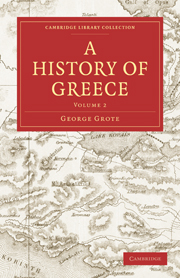Book contents
- Frontmatter
- Contents
- PART I CONTINUATION OF LEGENDARY GREECE
- CHAPTER XVIII Closing events of Legendary Greece.—Period of intermediate darkness, before the dawn of Historical Greece
- CHAPTER XIX Application of Chronology to Grecian Legend
- CHAPTER XX State of Society and Manners as exhibited in Grecian Legend
- CHAPTER XXI Grecian Epic.—Homeric Poems
- PART II HISTORICAL GREECE
- Plate section
CHAPTER XX - State of Society and Manners as exhibited in Grecian Legend
Published online by Cambridge University Press: 29 August 2010
- Frontmatter
- Contents
- PART I CONTINUATION OF LEGENDARY GREECE
- CHAPTER XVIII Closing events of Legendary Greece.—Period of intermediate darkness, before the dawn of Historical Greece
- CHAPTER XIX Application of Chronology to Grecian Legend
- CHAPTER XX State of Society and Manners as exhibited in Grecian Legend
- CHAPTER XXI Grecian Epic.—Homeric Poems
- PART II HISTORICAL GREECE
- Plate section
Summary
Though the particular persons and events, chronicled in the legendary poems of Greece, are not to be regarded as belonging to the province of real history, those poems are nevertheless full of instruction as pictures of life and manners. And the very same circumstances, which divest their composers of all credibility as historians, render them so much the more valuable as unconscious expositors of their own contemporary society. While professedly describing an uncertified past, their combinations are involuntarily borrowed from the surrounding present: for among communities, such as those of the primitive Greeks, without books, without means of extended travel, without acquaintance with foreign languages and habits, the imagination even of highly gifted men was naturallv enslaved by the circumstances around them to a far greater degree than in the later days of Solôn or Herodotus; insomuch that the characters which they conceived and the scenes which they described would for that reason bear a stronger generic resemblance to the realities of their own time and locality. Nor was the poetry of that age addressed to lettered and critical auditors, watchful to detect plagiarism, sated with simple imagery, and requiring something of novelty or peculiarity in every fresh production. To captivate their emotions, it was sufficient to depict with genius and fervour the more obvious manifestations of human adventure or suffering, and to idealise that type of society, both private and public, with which the hearers around were familiar.
- Type
- Chapter
- Information
- A History of Greece , pp. 79 - 158Publisher: Cambridge University PressPrint publication year: 2010First published in: 1846

